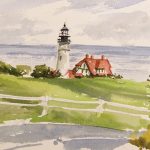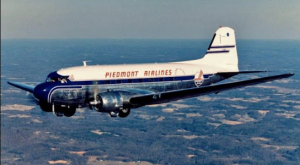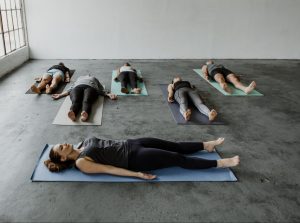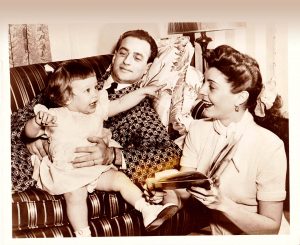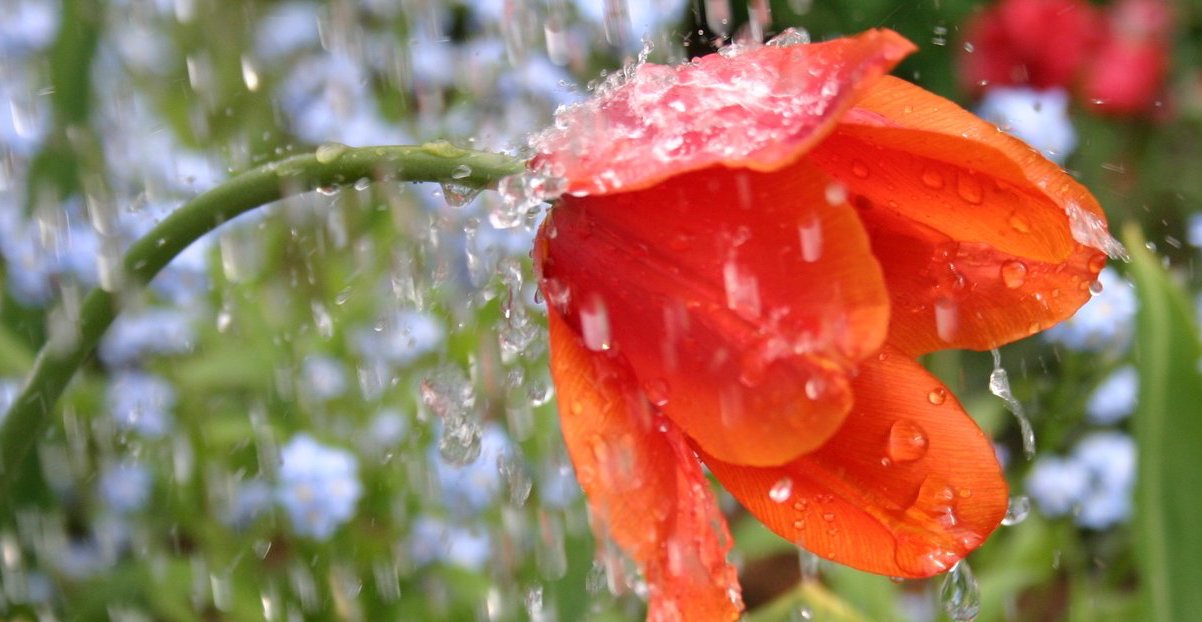
Rainy Sundays
By Jim Dodson
It’s raining this morning, a Sunday in early May.
Few things, meteorologically speaking, make me happier.
To begin with, Sunday is my favorite day.
Also, soft rain is a gardener’s blessing. Together, rainy Sundays make the world a smaller, quieter place, encouraging certain hardworking souls – my beautiful Yankee wife, let’s say — to burrow a bit longer beneath covers before she’s roused by the muddy-pawed crowd (human and canine) to stage one of her heroic Sabbath morn breakfasts, with time off allowed for good behavior to read the newspaper and talk of small things, savoring a peace that passeth weekday understanding even as her husband heads off for the garden.
For me, on a different level, rainy Sundays stir involuntary memories of my family’s odyssey through the strange garden of the deep South during my first seven years of life, a South that really no longer exists outside the boundaries of my mind, shaped by solitary days of a childhood passed in a succession of small sleepy southern towns where my father worked at the newspaper and my brother and I were pretty much left to roam the world untethered, forever ditching our shoes, Boxcar boys growing up wild and free.
First there was Gulfport where my pregnant mother and I would walk the broad flat beach in the evening light, shoes in hand, collecting interesting shells and keeping watch for approaching storms over the vast Gulf of Mexico, a body of water that was often as still as bathwater but reportedly coughed up more diverse shells than any other ocean on the planet.
This information came from a mountainous pressman named Tiny Earl, who worked at the weekly newspaper my dad owned with his silent investment partner.
Tiny Earl also let it slip that we happened to reside “smack in the middle of Hurricane Alley,” predicting that any day now a “killer” hurricane would churn up from the Gulf to wreak incredible devastation on Gulfport and neighboring Biloxi.
Looking back, I was secretly thrilled at this terrifying prospect and immediately wrote off to the National Geographic Society for an official Hurricane Watch kit that included a special map of common hurricane patterns and a preparation guide plus membership card.
A few impressive storms did boil out of the Gulf during the two years we lived across the street from the state beach, bringing curtains of rain and fearsome winds but disappointingly no named hurricanes that I could later claim to have witnessed and somehow miraculously survived. That distinction would come half a century later when Hurricane Katrina wiped away hundreds of lives, homes and businesses on the very coast where we lived.
A different kind of hurricane blew us home to Carolina.
My mother lost her baby the same week my father lost his newspaper owing to a silent partner who cleaned out the paper’s bank accounts following his Tuesday Kiwanis luncheon and struck off for parts unknown with the cigarette girl from a downtown hotel.
My father had just returned from a trip to Memphis where he’d purchased a new printing press that would allow his newspaper to publish five days a week in the new year. Instead, he lost both his newspaper dream and life savings in one afternoon, not to mention a third baby boy later that week.
In my mind it was softly raining the late November evening we left Gulfport for the overnight drive to North Carolina, though I could simply be imagining this because of the rain that seemed to follow us everywhere in those days.
I do have a clear memory, however, of my dad’s nine employees lining up on the sidewalk to say goodbye, and my father handing each one of them a small white envelope that contained – as I learned from my mother decades later – the last of my parents’ savings. Tiny Earl the pressman gave me, of all things, a waterproof flashlight that I kept for years. Tina the receptionist gave me a handful of peppermint candies for the overnight ride home to Carolina.
We wound up living by Greenfield Lake in Wilmington for one year, where the weather either seemed blazingly hot and sunny or moodily cool and rainy. I hoped for a hurricane but none came, though I did learn to swim in the little lagoon near the drawbridge to Wrightsville Beach one rainy summer Sunday after church, dog paddling about while a sudden shower freckled the surface of the water. I also learned to ride a bicycle that year, 1958, peddling along the oyster-shelled foot paths of Airlie Gardens and sidewalks in the rain around Greenfield Lake, my tires singing on the wet pavement.
After my mother’s second miscarriage, we spent another full year living in Florence, South Carolina, where I started the first grade and had perfect attendance and my father worked at the newspaper and my mother was nursed back to health by a wonderful black woman named Jesse May Richardson, who looked after my brother and me during the week and always checked in on us after her own church services on Sunday.
Among her many gifts, Miss Jesse May taught my mother – a former Miss Western Maryland beauty queen — how to garden and cook “real” Southern food.
She also taught me to “feet dance” by hoisting me up by my skinny arms and lowering me onto her own canvas work shoes, shimmying us both around the kitchen while supper cooked on the stove and gospel music played from her transistor radio in the window over the sink. To this day, anytime I hear “I’ll Fly Away” or “Over in the Glory Land,” I’m inclined to dance on the spot or at least move my feet to the holy beat.
It was Miss Jesse May, in fact, who first informed me that rain is holy water, the Lord’s way of helping the world grow flowers and food. “So never say a cross word about a rainy day, Child!” she instructed me, just one of many important things I was told that year– quite bossily at times, I might add, with unwavering authority from my mother — including the fact that no civilized child ever removes his shoes in a public place, and certainly not at the Piggily Wiggily — no matter how hot it happens to be outside or how cool the tiled floor of the newly air-conditioned grocery store feels under your bare feet.
My mother liked to say she owed Miss Jesse May her life, and I believe there is Gospel truth in that. For what it’s worth, I still use her recipe for seasoned collards every Thanksgiving.
It rained the Sunday we went to see her in the colored wing of the old Florence Memorial Hospital. This was just before Christmas of 1959. My parents refused to tell my brother and me what was wrong with her. We came straight from church. My mother took her a bright bouquet of flowers from the florist shop near the newspaper.
Her funeral a week later was held at a small freewill Baptist church on the outskirts of Florence. It must have been on a Saturday. The service was long but I liked the music and met Miss Jesse’s grown daughter, Babygirl, who drove up from Atlanta. That Sunday it rained. I remember this because my mother said a good rain was Miss Jesse May’s doing – the winter garden out back needed it.
Within weeks, however, we moved home to Greensboro, where I joined Miss Chamberlain’s second grade class at Braxton Craven Elementary for the new year, 1960. That week we were asked to bring a poem to class and read it aloud. I chose Robert Louis Stevenson’s poem “Rain,” a ditty lodged in my head to this day.
The rain is raining all around,
It falls on field and trees,
It rains on the umbrellas here,
And on the ships at sea.
His message seems clear. Rain feeds the earth and oceans and connects us all to each other, wherever life’s voyages take us.
Miss Jesse May was right.
Why else is water mentioned just 39 words into the Book of Genesis, even before the Almighty made light to separate the day from night; even before He created the land and stars, the beasts of the field, the birds of the sky and finally man. We bathe in water, we baptize new life with it; rainwater washes away the dust of the day, cools city streets and washes windows of the soul; makes the world green and forever new, gives us flowers and food.
Perhaps this explains why, six decades later, I’m prone to lose track of time when I’m working in my garden on rainy Sunday mornings.
The scent of watered Earth and growing plants takes me back to a quiet South that may rightfully exist only in memory – and a very privileged one at that – but shaped so much of what I believe about life and people and worlds both seen and unseen.
Not long ago, after an early hour of spot weeding in a light Sabbath mist, I hurried off to church forgetting to change out of my muddy garden shoes.
An elegant older lady who often shares our pew, gave me an amused look and nodded at my feet, where chunks of red clay and bits of mulch clung to my khakis and shabby canvas shoes.
“I can see where you’ve been this morning,” she whispered with a chuckle, as our pew rose to head for the communion rail. “Closer to God’s heart in a garden, dear?”
“Yes ma’am,” I replied.
For a crazy instant, I was tempted to kick off my muddy shoes and take communion in my bare feet.
But then a voice in my head reminded me that this was the Lord’s house and not the Piggily Wiggily — where even muddy shoes are acceptable at the table.
So up I went, hoping it was the Almighty who’d spoken to my heart.
On the other hand, it could easily have been Miss Jesse May Richardson.

